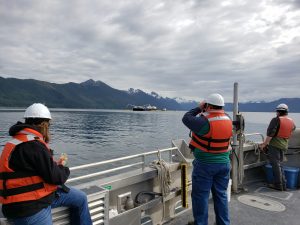Drills and exercises conducted last year in Prince William Sound continued to test the new vessels and equipment brought in by the new spill response contractor, Edison Chouest, in 2018. In addition, the year’s drills helped train the crews of the tugs and tankers on various aspects of spill prevention and response in Prince William Sound.

During the year, mariners practiced towing tankers, attaching tether lines between tankers and tugs, deploying and operating oil spill response equipment in both open water and near the shoreline, communicating between command posts in Valdez and Anchorage, and many other response activities.
Tracking lessons over time
The Council observes many of these drills and exercises and issues an annual summary of the previous year’s activities and observations. These reports track the history of spill preparedness and response by Alyeska’s SERVS and the associated shippers.
For example, this report notes that in the past few years, responders have become more proficient at deploying protections for the Valdez Duck Flats, an estuary which is home to numerous species of wildlife. The report recommends similar training for the nearby Solomon Gulch Fish Hatchery, another area that is particularly sensitive to oil contamination.
Improving spill response
The report also included the Council’s recommendations for future exercises. Two of the suggestions would increase safety: using full personal protection equipment, or PPE, during some exercises; and conducting more drills at night.
The PPE recommendation stemmed from a 2018 exercise where Council staff observed responders struggling to communicate via radio while wearing a respirator, which some responders removed. During a real event, respirators could be needed in contaminated areas due to hydrocarbon fumes in the air.
The Council has supported conducting drills during hours of darkness for the last several years. On the shortest days of December in Prince William Sound, daylight only lasts for 6 hours or less. Responders need to practice finding and recovering oil in the dark to be able to mount an effective spill response in winter.
The reports help the Council improve the spill prevention and response system. Analysis of these reports over time can help identify operational issues and help improve the prevention and response system.
COVID-19 affecting drills and exercises in 2020
This report covers drills and exercises conducted in 2019. In 2020, the COVID-19 pandemic disrupted the normal schedule. Drills and exercises have continued, although they have been modified to accommodate safe pandemic practices.